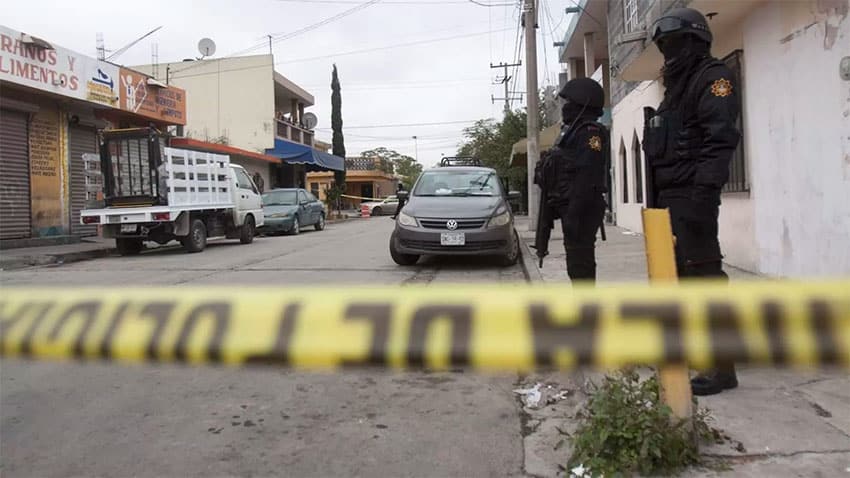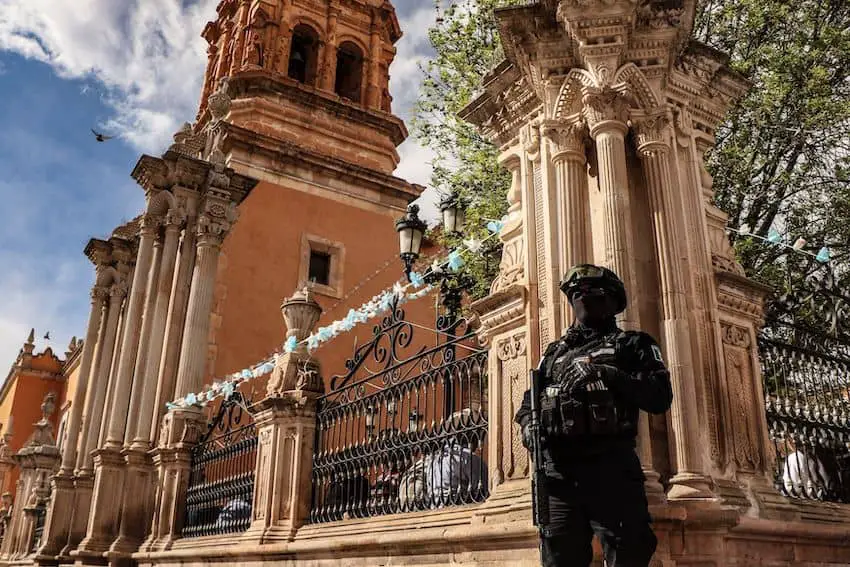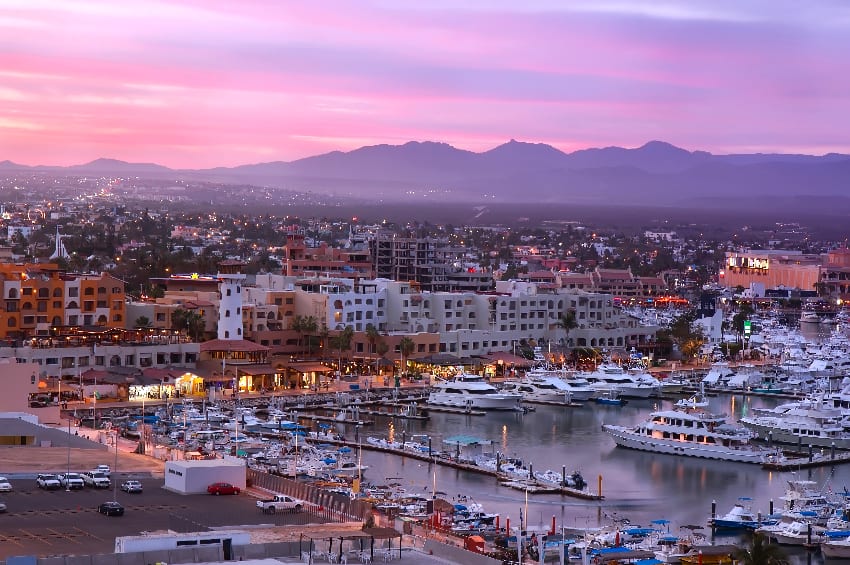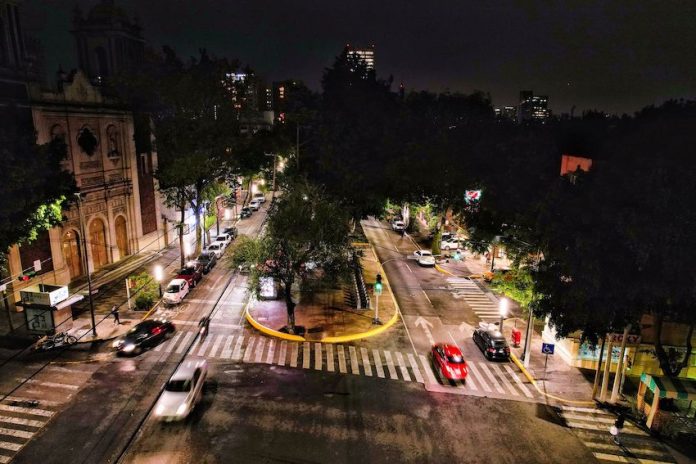The percentage of Mexicans who believe the city in which they live is unsafe declined to its second-lowest level on record in the second quarter of 2024, according to the results of a recent survey.
However, authorities still have a lot of work to do as close to six in 10 survey respondents consider their city unsafe.

Conducted by the national statistics agency INEGI between May 24 and June 14, the latest National Survey of Urban Public Security (ENSU) found that 59.4% of adults have security concerns about the city in which they live.
A year earlier, 62.3% of those surveyed said their city was unsafe, while the figure in the first quarter of 2024 was 61%.
The second quarter percentage is just 0.3 points higher than the all-time low of 59.1% in the final quarter of 2023. INEGI first conducted the ENSU in 2013.
The perception of urban insecurity in Mexico reached almost 80% in 2017 and 2018, the final years of the government led by former president Enrique Peña Nieto.
The latest survey found that 65.1% of women and 52.4% of men consider their city unsafe.
For the latest ENSU, INEGI surveyed adult occupants of 27,850 homes in 91 urban areas across Mexico, including the 16 boroughs of Mexico City.

At a press conference on Wednesday, President-elect Claudia Sheinbaum highlighted that ENSU data shows that “Mexicans who live in cities today feel safer than they did in 2018.”
President Andrés Manuel López Obrador took office on Dec. 1, 2018, while Sheinbaum was sworn in as Mexico City mayor four days later.
The president-elect told reporters that Mexico has made progress in reducing insecurity during López Obrador’s presidency, and pledged that her administration will “make more progress” during its 2024-2030 term.
Which cities have the highest and lowest percentages of residents with personal security concerns?
Fresnillo, Zacatecas, once again had the highest percentage of residents who told INEGI that the city was an unsafe place to live. The latest ENSU found that 94.7% of Fresnillo residents consider the city unsafe, a decline of 0.7 percentage points compared to the previous survey.

Located about 60 kilometers north of Zacatecas city, Fresnillo has been plagued by violent crime in recent years. The results of each of the four ENSUs conducted in 2023 also showed that the city of some 240,000 people was considered unsafe by over 90% of residents.
The cities with the next highest percentages of residents with personal security concerns were:
- Naucalpan de Juárez, a México state municipality that adjoins Mexico City. Just under nine in 10 residents — 89.2% — consider the municipality an unsafe place to live.
- Uruapan, Michoacán: considered unsafe by 86.8% of surveyed residents.
- Irapuato, Guanajuato: 84.8%.
- Tapachula, Chiapas: 84.7%.
- Zacatecas city: 84.7%.
The cities with the lowest percentages of residents with personal security concerns were:
- San Pedro Garza García, an affluent municipality in the metropolitan area of Monterrey, Nuevo León. Just over one in 10 surveyed residents — 11.7% — said the municipality was an unsafe place to live.
- Piedras Negras, Coahuila: 14.3%.
- Los Cabos, Baja California Sur: 16.7%.
- Los Mochis, Sinaloa: 18.7%.
- The Mexico City borough of Benito Juárez: 18.9%.
- Saltillo, Coahuila: 21.4%.
Perceptions of insecurity down significantly in 10 cities, up in 5
Compared to the first quarter of 2024, there were statistically significant changes in perceptions of insecurity in 15 cities, INEGI said. In 10 of those cities — including five Mexico City boroughs — the percentage of residents with security concerns declined significantly, while the percentage increased significantly in five.

The cities where there were significant decreases were:
- Los Cabos, Baja California Sur: 24.8% in Q1 to 16.7% in Q2.
- Chihuahua city: 59.3%-49.4%.
- The Mexico City borough of Venustiano Carranza: 53.5%-42.8%-
- The Mexico City borough of La Magdalena Contreras: 59.4%-49.1%.
- The Mexico City borough of Tlalpan: 58.5%-42.2%.
- The Mexico City borough of Iztapalapa: 72%-56.9%.
- The Mexico City borough of Álvaro Obregón: 65.5%-55%.
- Nezahualcóyotl, México state: 69.2%-61.1%.
- San Pedro Garza García, Nuevo León: 27.1%-11.7%.
- Los Mochis, Sinaloa: 26.1%-18.7%.
The cities where there were significant increases were:
- Manzanillo, Colima: 54.8% in Q1 to 63.7% in Q2.
- The Mexico City borough of Benito Juárez: 11.1%-18.9%.
- The Mexico City borough of Azcapotzalco: 55.3%-67%.
- Chetumal, Quintana Roo: 56.2-73.3%.
- Tlaxcala city: 46.8%-56.3%.
The places where Mexicans most commonly feel unsafe
Just under 68% of ENSU respondents reported feeling unsafe while using ATMs on the street, while 62.7% expressed security concerns about traveling on public transport.
More than 50% of respondents said they felt unsafe at the bank, on the streets they regularly use and on the highway.
The numbers were higher among women than among men in all those places — and several others, including the home and the workplace.
Crime and anti-social behavior
Among the respondents who reported having seen or heard criminal activity or anti-social behavior near their homes in the second quarter of 2024, six in 10 said they had observed people drinking in the street.
Almost 48% of respondents reported having witnessed a robbery or mugging, and around four in 10 told INEGI they had witnessed homes or businesses being vandalized.
Just under 40% of those surveyed said they had seen people buying or consuming drugs and 36.4% reported having heard frequent gunshots.
Just under one-quarter of respondents said they had witnessed some kind of gang activity in the city in which they live.
Opinions on Mexico’s security forces
The Mexican Navy is the country’s most effective security force, according to the results of the latest ENSU. Almost 87% of respondents said they believe the Navy is very or somewhat effective in preventing and combating crime.
Just under 83% of those polled said the same about the Army, while the figures for the Air Force and the National Guard were 82.4% and 74.1%, respectively.
Almost 57% of respondents said that state police forces are very or somewhat effective in preventing and combating crime, while 48.7% said the same about municipal police.
Citizens’ security expectations
Almost one-third of survey respondents — 32.4% — said they expected the security situation in their city to remain “just as bad” during the next 12 months, while 18.1% predicted a deterioration.
Almost three in 10 of those polled — 28.7% — said they expected security to improve in their place of residence during the next 12 months, while 18.8% anticipated that the situation would remain “just as good” as it currently is.
With reports from Reforma
